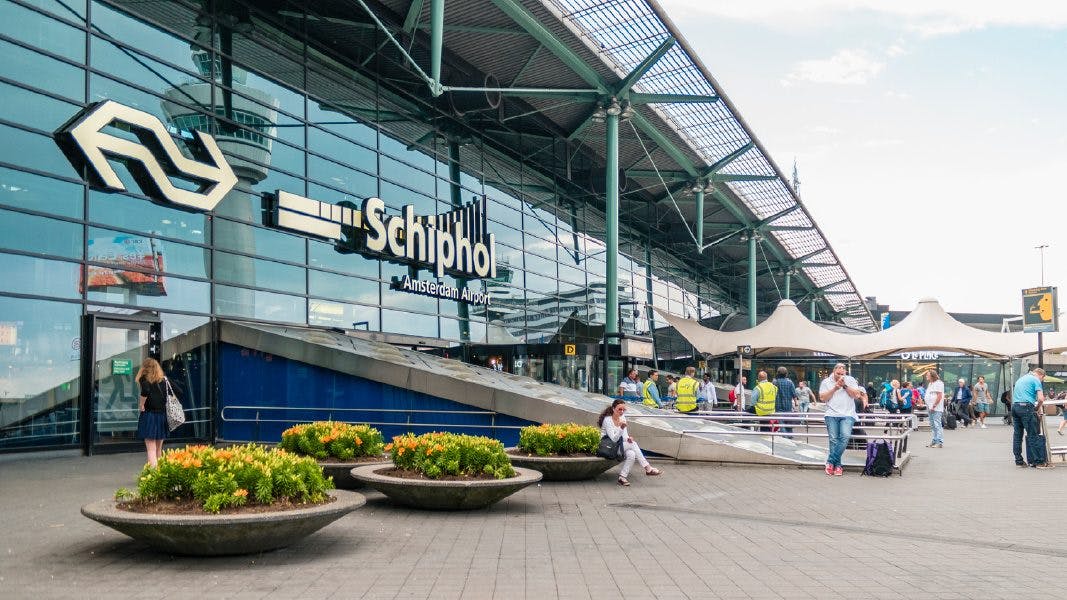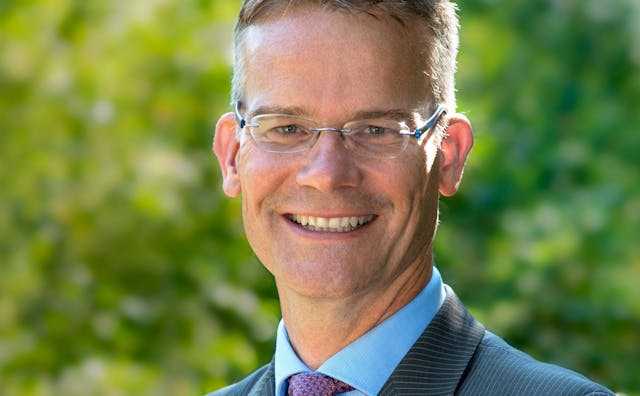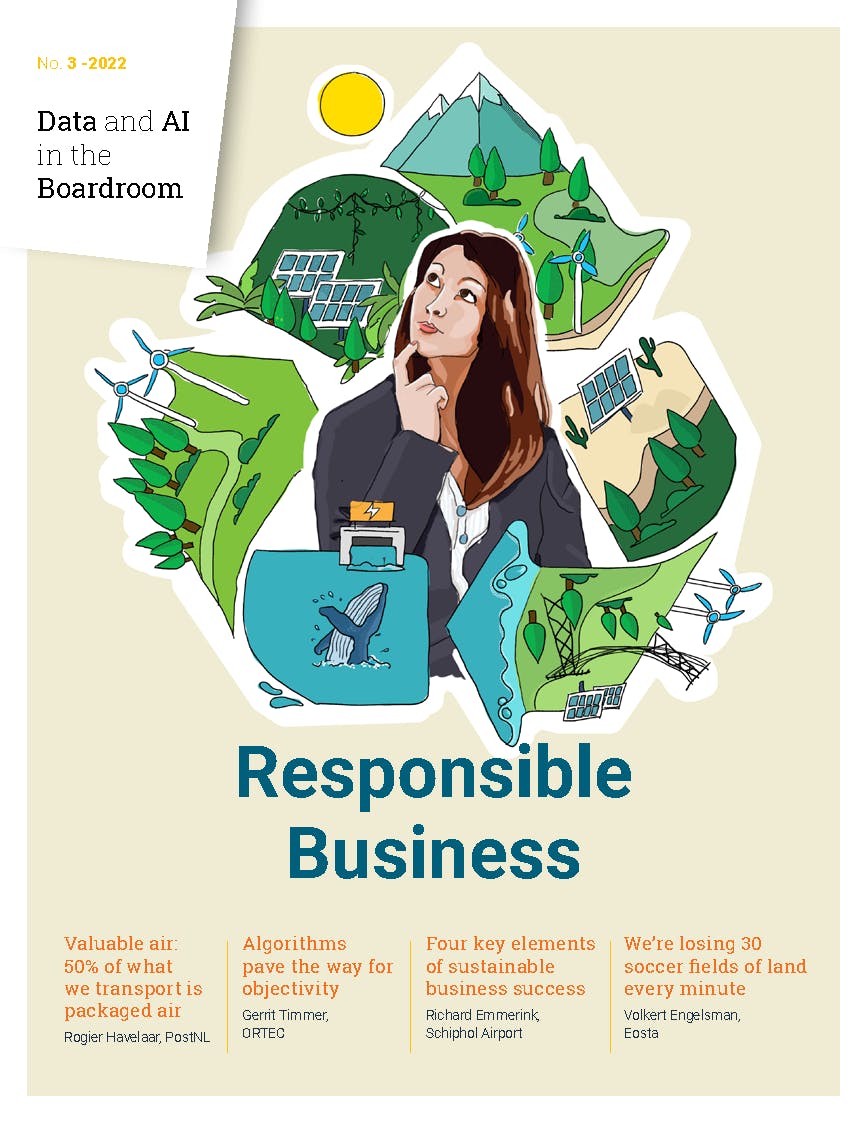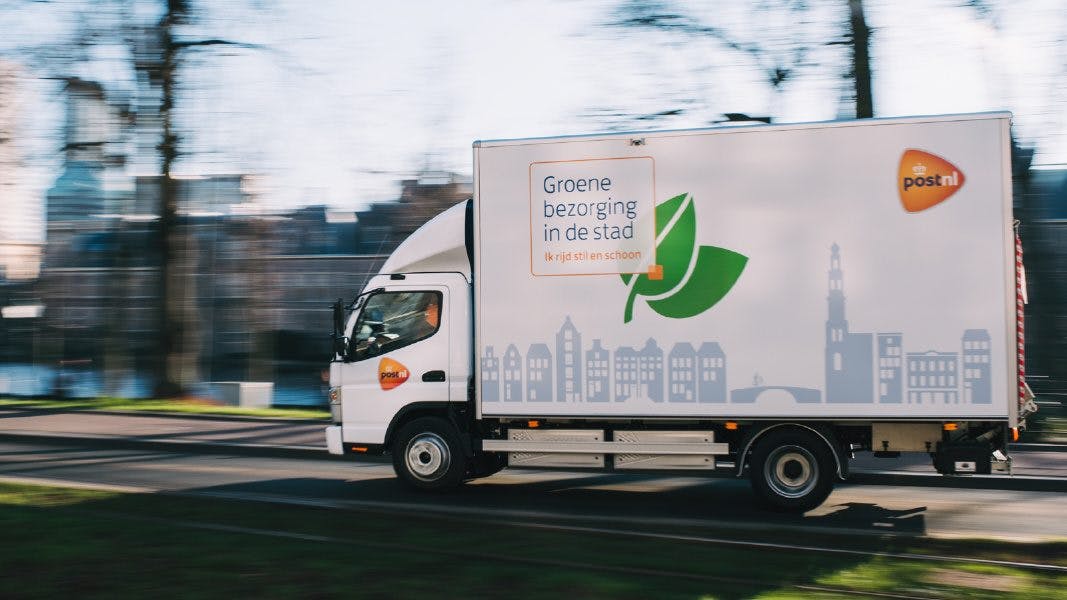Four key elements of sustainable business success
Read time: 10 minutesEver since Richard Emmerink got his PhD in transport economics, he has had an undying love for all things transport. After building his career at road transport companies, he had a change of heart and transitioned to the world of air traffic three years ago, becoming director of Strategy and Airport Planning at Royal Schiphol Group. Together with his team, Emmerink is exploring what future airports should look like. “We cover everything from runways, gates and terminals to air-rail substitution and hyperloops.” After all, Emmerink et al. are driven by the ambition to make future airports, and preferably all of European aviation, as sustainable as possible. He also believes that you should show that you mean business. “It’s important that your personal ambitions are in line with those of the company. If they’re not, you’re at the wrong company.”
Interview with Richard Emmerink, Director of Strategy and Airport Planning at Schiphol

As Emmerink sees it, four key elements go into successfully traveling the path to sustainable business. "First of all, a sense of urgency. Everyone has to understand that this is a problem that requires urgent action. On top of that, sustainability should be integrated into the company’s overall vision and strategy. I don’t believe in isolated sustainability departments as part of a greater whole. For me, that approach amounts to little more than greenwashing. Rather, the company as a whole should endorse the importance of sustainability. Next, you need to set ambitious targets for yourself and identify partners with whom you can effect meaningful change. Finally, you simply need a clear plan. And that’s exactly what we did at Schiphol, setting out our goals in our ‘Most Sustainable Airports Roadmap’ and detailing specific actions we will need to take to accomplish these goals.”

Richard Emmerink, Director of Strategy and Airport Planning at Schiphol
"It’s important that your personal ambitions are in line with those of the company. If they’re not, you’re at the wrong company."
Quality over quantity
Greening a sector that Emmerink himself repeatedly characterizes as being “hard to abate” doesn’t sound like it should be a problem, but even though the ultimate goal is very clear, getting there is easier said than done. Just before the corona crisis hit, Royal Schiphol Group did redefine its vision. “That vision, Schiphol 2050, isn’t about quantity, and certainly not about unrestricted growth, but about quality: the quality of our network, of the living environment and for the passengers and airlines. Personally, I was always filled with pride whenever I had to travel through Schiphol, even before I started working here. As an infrastructure hub, it has reached an almost un-Dutch level of greatness. Maybe it has something to do with the fact that going to Schiphol generally precedes a fun trip or the like, but apart from that, it’s a place that just makes you feel good. The goal is to continue to foster this feeling and spark joy for the region and the Netherlands as a whole.”
ORTEC: How does Schiphol plan to achieve this over the next three decades?
“We want to continue supporting the Dutch economy and Dutch vacationers. How we’re going to go about making that happen? In the most sustainable, best way possible. We believe that this will prove to be the biggest challenge faced by the aviation industry in the decades to come. Personally, I would love for my children to be able to explore and discover the world, and the simple fact is that you need airplanes to do so. At the same time, we have to admit that aviation causes pollution and although its overall contribution to global emissions is not massive, we all have to do our bit to reduce our footprint. Schiphol's ambition is to be at the forefront of evolution, but in a sensible way. I often compare it to a rubber band. We want to be front runners and bring the rest of the pack with us, but if you pull to hard, the rubber brand will break, leaving you unable to continue and the rest without a leader to inspire change. It's a tricky balance."
“Schiphol wants to hit the Paris goals. Period. And we’re on track for 2030.”
ORTEC: In your words and in the words of Schiphol CEO Dick Benschop, Schiphol should abide by the Paris climate agreement and achieve the goals by 2030. 2050 is a bit further down the road. Have you mapped out all the steps you will have to take?
“Schiphol wants to hit the Paris goals. Period. And we’re on track for 2030. The parts that we can influence are all hard targets. We follow the abatement curve and start with the relatively easy and relatively quick changes, making full use of natural opportunities for improvement, such as the construction of our A pier and contract extensions. These are all intermediate steps towards accomplishing the industry's greater goals: making fuel more sustainable and electrifying flying."
Download the magazine
This article is part of the 3rd issue of our magazine Data and AI in the Boardroom. Get your copy now.
We've asked leading figures in different sectors about how their organizations develop into more sustainable businesses, what goals they have set for themselves, what challenges they face underway, and how using data in innovative ways help them to make responsible decisions.
In this issue you’ll catch a glimpse of the approaches by leading figures at organizations like Schiphol Airport, PostNL and Eosta.

Sustainable aviation
“We’re not an aviation company ourselves, but we do feel a sense of shared responsibility. The ultimate, common goal, the big one, is sustainable aviation. In the end, kerosene will have to become sustainable in order to reach that point. At the same time, we do contribute to carbon emissions, so we have to get our own house in order before we can really enter the discussion. Our first ambitious intermediate goal is scheduled for 2030. The EU has set itself the goal of reducing carbon emissions with 55% by 2030 compared to 1990, while we’re striving to go the full 100%. In addition, our goal is to become a circular company. The first stop on the way is achieving zero waste by 2030.”
Everything starts with data and analysis, Emmerink points out. “When it comes to going circular, we distinguish between two streams. The operational side of things, which comes down to waste produced by passengers, and the infrastructural side of things, which revolves around what we build and which materials we use. The second stream is the largest, but the first is very visible, making it a great way to showcase your recycling efforts. With regard to infrastructure, we have started reusing copious amounts of old materials. For example, major maintenance is currently being carried out on the Polderbaan, and we are using as much residual material as possible."
ORTEC: Schiphol aspires to play a leading role, but it will always depend on politics, national and European measures, and all kinds of other interests. How much space is left to exert influence yourself?
Schiphol has joined forces with other stakeholders in an attempt to “massage policy in that direction”, the Director of Strategy and Airport Planning relates. “The EU’s Green Deal stipulates that it will become mandatory to blend traditional kerosene with a certain percentage of sustainable fuel, such as bio-kerosene and synthetic kerosene. This will prove an important development, as it forces the industry into action and stops them sitting idly by. At the moment, there are relatively few buyers for sustainable fuel because it is considerably more expensive than fossil fuels. In the Netherlands, we have agreed that kerosine should be blended in a 86-14% ratio by 2030, which is a clear signal to producers that their products will be in demand. Good public policy is essential." Because a coordinated global approach still seems a way off, we have to start at the European level, Emmerink argues: “The Netherlands could decide to go at it alone, but you’d have to be very careful to avoid implementing ineffective policy that appears to be beneficial but actually just defers the problem.” In Emmerink’s opinion, the notion of a creating level playing field is often a lethal blow to any well-meaning discussion. “Of course, we have to create a level playing field to avoid doing too much damage, but the field should still be inspired to move in the right direction and there should be efforts to build as large an alliance as possible. Schiphol and several other major airports are quite far ahead in this regard.”

Richard Emmerink, Director of Strategy and Airport Planning at Schiphol
"Schiphol 2050, isn’t about quantity, and certainly not about unrestricted growth, but about quality: the quality of our network, of the living environment and for the passengers and airlines."
Taking our responsibility where possible
Emmerink stresses that when Heathrow and Schiphol join forces, their voices are heard: “If the Dutch government were to start taking measures that solely target and therefore hamper Dutch aviation, you could wonder whether this would constitute sound policy. I’m a staunch supporter of the EU’s Emission Trading System, but it has to be streamlined. There should be fewer free rights and more should be covered by system - ideally even traffic outside Europe."
ORTEC: Slots at Schiphol are scarce, or at least they were before the corona crisis. Why should Schiphol not just decide to blend in sustainable fuel with traditional fuel and pass the costs on through ticket prices?
“We’re not a fuel company, but we are eager to see innovation. That’s why we co-invested in a project in Delfzijl along with KLM and SKYNRG that revolves around scaling up sustainable fuels based on frying grease. On top of that, we also invested in a research project into synthetic kerosene at Rotterdam Airport, which is now ready to take the next step. More recently, we played a role in the launch of SynKero, a company looking to start producing synthetic kerosene in the Port of Amsterdam. We believe it’s important to take our responsibility at the riskiest stage, right at the very beginning. As soon as sustainable kerosene starts to evolve, we hope to pass the baton to the Shells of the World.”
“As soon as sustainable kerosene starts to evolve, we hope to pass the baton to the Shells of the World.”
Even if Schiphol did want to produce its own sustainable fuel and pass on the costs by upping its airport charges, it would face a major challenge, Emmerink notes. “Airport charges are completely regulated. We do face some competition from other major hubs, but in the Netherlands, the Authority for Consumers & Markets sees us as a monopolist. The prices we can charge passengers and airlines to use our facilities have been defined in a legal framework, which does, admittedly, allow us to differentiate to some degree, e.g. by charging different rates for planes in different noise categories. Newer planes are considerably less noisy, but because airlines often use aircrafts for more than 20 years, you can’t just double your rates for certain categories. You also have to give them the opportunity to change."

Richard Emmerink, Director of Strategy and Airport Planning at Schiphol Airport
"Schiphol wants to hit the Paris goals. Period. And we’re on track for 2030."
European policy
“It is clear to see that the work we are putting in with our partners has led to ambitious goals. Recently, the European aviation industry commissioned a report entitled ‘Destination 2050’, detailing its ambitions to become net-zero by 2050 and outlining its efforts to make this happen. It's a more ambitious plan than I've seen to date, and I was excited to see that all the big names signed it. To start realizing this plan, however, we need European policy and investment in innovative solutions such as electric flying, hydrogen-powered planes and, most importantly, sustainable fuels. Synthetic kerosene is probably the most interesting option, but the problem is that it requires tons of renewable energy. That’s another piece of the puzzle: the European Union should accelerate and encourage the generation of renewable energy.
“Computers, though, are a lot better at figuring out optimal situations, so autonomy will only increase in the years to come. It’s an essential part of innovation.”
Autonomous processes
ORTEC: In other domains of logistics, we have seen parties optimize their operations independently without seizing opportunities to improve efficiency in each other’s networks. For this to happen, there has to be a willingness to share data and capacity. Has Schiphol implemented any initiatives to achieve shared efficiency gains?
“There is clear room for improvement. Admittedly, we have to deal with an entire chain, and we’re only the infrastructural link. Recently, before COVID, Schiphol invested in an Airport Operations Centre, or APOC, where we try to create a centralized data repository - consisting of our own data and third-party data - that will allow us to make predictions and improve our processes. Not everyone is as eager to share their data, but showing that everyone will benefit is often a convincing argument. We’ve reached a point now, though, where this is understood by everyone. The fact that Schiphol, with 500,000 aircraft movements, is becoming increasingly "constrained," or at least before the COVID epidemic hit, also played its part. The better you have to plan and coordinate, the more willing parties will be to cooperate." In the near future, Emmerink expects airport processes to become a whole lot more autonomous: “Although we use a lot of smart scheduling software, including ORTEC’s solutions, our operations still require a lot of human input. Computers, though, are a lot better at figuring out optimal situations, so autonomy will only increase in the years to come. It’s an essential part of innovation, because it makes airports considerably less hectic, whilst also benefiting security, which - at the end of the day - is Schiphol’s most important asset. Improving security will also help us maximize our sustainable impact.”
“To start realizing the Destination 2050 plan, we need European policy and investment in innovative solutions such as electric flying, hydrogen-powered planes and, most importantly, sustainable fuels.”
About the interviewee
Richard Emmerink is Director of Strategy & Airport Planning at the Royal Schiphol Group. Emmerink holds a PhD in transport economics, and has worked as a cfo/coo and consultant at various companies in the logistics and finance sectors, including Aegon Netherlands, Abellio and McKinsey. Before making the switch to Schiphol, he was cfo/coo at Connexxion Openbaar Vervoer N.V.
This interview was conducted by Guido de Wit, Practice Lead Sustainability and Arjan Gras, Interviewer.
Don't miss out on the next insights
Sign up to our mailing list and be the first to receive our newest insights and digital magazine in your mailbox.

